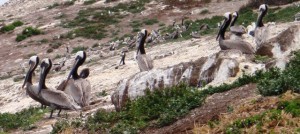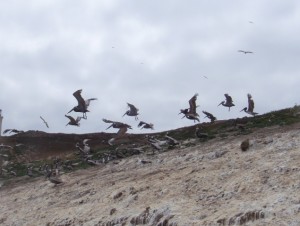We often saw groups of Brown Pelicans flying in formation around both Anacapa and Santa Barbara Island during our voyage. These birds were everywhere! Pelicans prefer to nest on islands that are not inhabited by humans, making Anacapa and SBI prime nesting sites. Though featherless and helpless after hatching, immature Brown Pelicans grow quickly and have been known to consume over 100 pounds of fish and squid while they are being cared for. We often saw mature individuals diving for food near the island (Brown Pelicans are the only Pelicans that do this).
Brown Pelicans have been steadily increasing in number since the 1970’s when they were almost completely wiped out due to high bioaccumulation of organochlorine contaminants, such as DDT and PCBs, in their food supply. Since then, however, their population size has been steadily increasing and the Brown Pelican has since been removed from the California Endangered Species list.
Because Pelicans choose to roost on islands with no predators, they are really only susceptible to human disturbance, including bright lights, noise, fishing activity, and even kayaking and recreational boating. It is now suggested that people stay at least 100 meters from nesting Pelicans to avoid influencing chick abandonment and other negative behavior.


